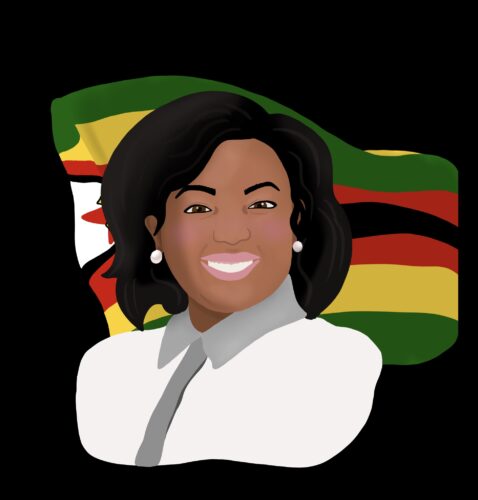Art courtesy of Ellie Gabriel.
In a normal year, you can find Phyllis Mugadza (’22 BS/MPH) hanging out in the Silliman courtyard, giving tours of Yale’s campus, or working as a recruitment coordinator in the admissions office. In between classes and work, Mugadza, a mechanical engineering major, spends her free time innovating the world around her.
This past winter, Mugadza was selected as one of the winners of the 2020 Reimagine Challenge, a scholarship competition that aims to identify innovative solutions that will help spark global movements and build back from COVID-19. For her proposal, Mugadza focused on the growing waste mismanagement crisis in several developing nations. Despite the serious public health problems they pose, waste sites have become unique spaces of creation in which grassroots innovators repurpose discarded materials into art and commodities. Mugadza, inspired by the creative superpower of these creators, proposed a novel method of addressing the waste mismanagement crisis: opening makerspaces to support grassroots creators, bolster local economies, and repurpose waste.
Mugadza’s passion for innovation first blossomed out of a desire to help her home community in Harare, Zimbabwe. “The biggest challenge I found was that a lot of women around me were missing school—my friends would miss work when they were on their period because of dysmenorrhea, or menstrual pains,” she said. The inaccessibility of medicine, sanitary products, hygienic facilities, and education on menstruation created ubiquitous barriers to everyday life. “When I committed to Yale, I wanted to commit my entire engineering journey to finding a solution for this problem,” she said. Over the past four years, Mugadza has collaborated with OB-GYNs at the medical school, conducted surveys with menstruators of all identities, and iteratively designed a device that can effectively collect menstrual blood and treat dysmenorrhea.
Listening to Mugadza feels liberating; her passion is palpable. Over the course of our conversation, I realized that Mugadza’s unique perspective comes from a belief in the potentiality of objects and people to build a happier, safer, and more equitable world. For her Reimagine Challenge proposal, Mugadza emphasized breaking out of a functional fixedness mindset—using everyday materials in new and exciting ways. Mugadza is inspired by the work of architects Kevin Kimwelle and Ashis Paul, who have built plastic bottles in their designs as storage hooks and as naturally cooling air filters. Mugadza wanted to center this kind of ingenuity in her project proposal. She believes that in order to solve this problem, we must empower local creators: “They possess a gift and a talent that the world needs right now,” Mugadza said.
As she described the process of designing a menstrual device, I started to understand Mugadza’s experience in reimagining a better world. “I would say that a lot of my inspiration and motivation come from studying engineering at a university that is rooted in the liberal arts,” she said. Especially at first, Mugadza leaned heavily on Tsai City and her mentors for both guidance and support. She points to Alyssa Siefert, Christina Mainero, and Anjelica Gonzalez as some of the people who have helped her get to this place. “Mentorship has been extremely important, especially being a woman of color in engineering at Yale and all that comes with that,” she said. “My mentors have really uplifted me, connected me to resources, have pushed me to take up space, and always push me constantly to achieve.” Still, Mugadza is very transparent about her experiences being a woman of color in engineering and entrepreneurship: “I’ve had to put in a lot of extra work to make my voice heard in a lot of spaces. I felt like I was constantly being sheltered and limited by what I could achieve,” she said. In times like these, Mugadza turns to her mentors—particularly her female mentors of color—to help her get back to doing what she loves: building a better world.
Mugadza will graduate from Yale College in May, before moving to the School of Public Health full-time to complete her MPH. She hopes to launch her menstrual device startup Sprxng by the end of the year and plans to resume work on her makerspace project within five years. I walked away from our conversation feeling inspired and excited about the future. We often tend to feel like very small cogs in a very big machine—everything we do is a drop in the bucket. But Mugadza has demonstrated the power that each person has in creating a happier, safer, and more equitable world.

